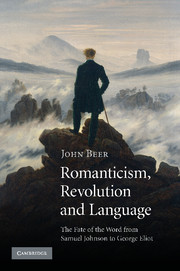Book contents
- Frontmatter
- Contents
- Preface and acknowledgments
- List of abbreviations
- 1 ‘Democracy’ in Somerset and beyond
- 2 Politics, sensibility and the quest for adequacy of language
- 3 The heart of Lyrical Ballads
- 4 The Prelude: a poem in process
- 5 Words or images? Blake's representation of history
- 6 Blake, Coleridge and ‘The Riddle of the World’
- 7 Challenges from the non-verbal and return to the Word
- 8 The Nature of Hazlitt's taste
- 9 Jane Austen's progress
- 10 Languages of memory and passion: Tennyson, Gaskell and the Brontës
- 11 George Eliot and the future of language
- Index
6 - Blake, Coleridge and ‘The Riddle of the World’
Published online by Cambridge University Press: 04 August 2010
- Frontmatter
- Contents
- Preface and acknowledgments
- List of abbreviations
- 1 ‘Democracy’ in Somerset and beyond
- 2 Politics, sensibility and the quest for adequacy of language
- 3 The heart of Lyrical Ballads
- 4 The Prelude: a poem in process
- 5 Words or images? Blake's representation of history
- 6 Blake, Coleridge and ‘The Riddle of the World’
- 7 Challenges from the non-verbal and return to the Word
- 8 The Nature of Hazlitt's taste
- 9 Jane Austen's progress
- 10 Languages of memory and passion: Tennyson, Gaskell and the Brontës
- 11 George Eliot and the future of language
- Index
Summary
Although Blake and Coleridge may or may not have set eyes on one another in youth, they were at least united in having literary ambitions. They were both fascinated by Milton's poem ‘On the Morning of Christ's Nativity’, for instance: while they might be daunted by the prospect of achieving anything to equal Paradise Lost, the mannerist mode of Milton's early poetry offered a more manageable and humane model to a young poet. Writing the first version of his Religious Musings in 1794, Coleridge assumed the persona of a humble shepherd so as to join his praises at the birth of the ‘Meek Man and lowliest of the Sons of Men!’ In the same year Blake went so far as to write his own pastiche of Milton at the opening of Europe, taking over his use of the Christmas season and the story of the universal peace at the time, and turning them to different effect:
The deep of winter came;
What time the secret child,
Descended thro' the orient gates of the eternal day:
War ceas'd, & all the troops like shadows fled to their abodes.
In this version of Blake's, the birth is that of Orc, the ‘horrent Demon’, the light of whose fury appears ‘in the vineyards of red France’ and in response to whom his father Los calls all his sons ‘to the strife of blood’.
As with this subversion of the gospel narrative, Blake believed Paradise Lost to embody a profound misreading of the human condition.
- Type
- Chapter
- Information
- Romanticism, Revolution and LanguageThe Fate of the Word from Samuel Johnson to George Eliot, pp. 99 - 112Publisher: Cambridge University PressPrint publication year: 2009



